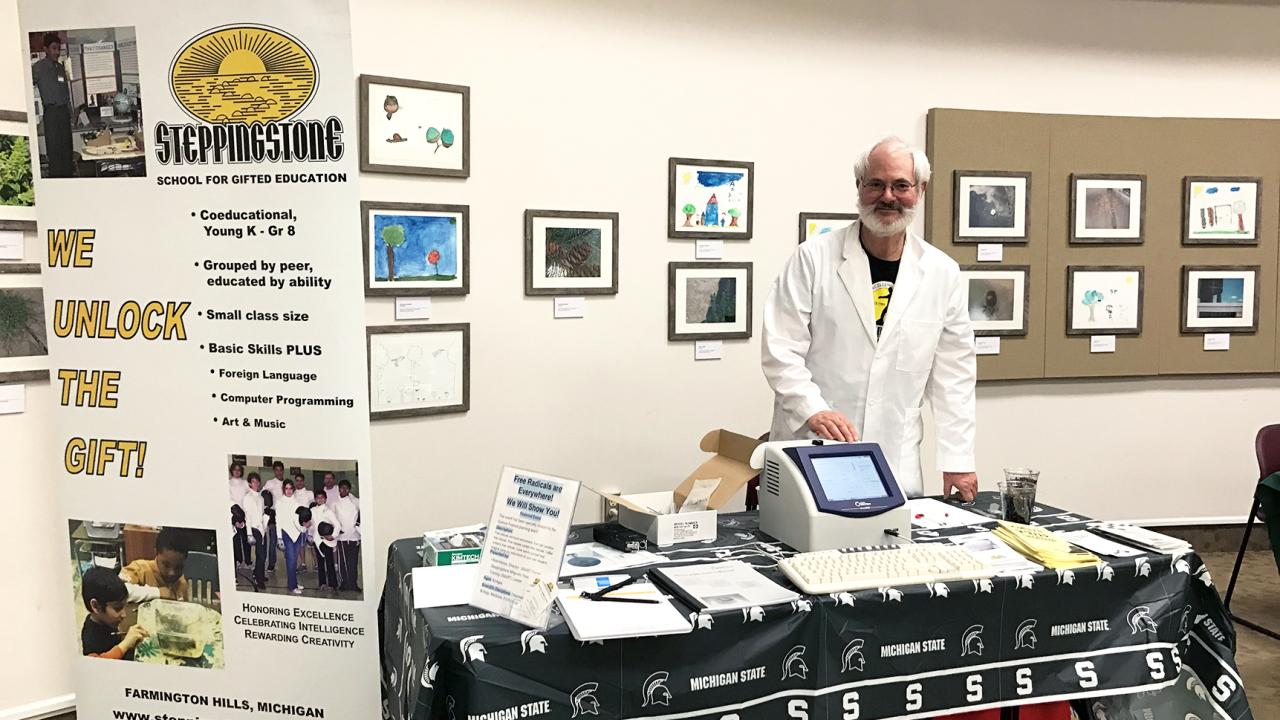
Reef Morse, ’67 BA and ’72 Ph.D. in Zoology, Director of Steppingstone MAgnetic Resonance Training Center
Quick Summary
- Reef Morse retired from Illinois State University's Chemistry Department in 2001
- Today, he is the director of the Steppingstone MAgnetic Resonance Training Center
- The SMART Center provides elementary through high school students with hands-on training to use spectrometers
Phillip “Reef” Dexter Morse II didn’t always have an affinity for science. In fact, he had a distinct distaste for the field as a child.
“It was the most boring thing,” said Morse, professor emeritus in the Department of Chemistry at Illinois State University. “It was just a bunch of junk to memorize.”
A tinkerer and builder, Morse didn’t connect with textbook-style teaching approaches. But in the seventh grade, his conception of science changed thanks to a teacher who emphasized hands-on learning in the classroom. The pedagogy stuck with him.
Now retired from university life, Morse is the director of the Steppingstone MAgnetic Resonance Training (SMART) Center, which provides elementary through high school students with hands-on training to use electron spin resonance spectrometers as research tools.
“The idea that science is something that you do, I think, has been missing, especially for elementary school kids,” said Morse. “So, I thought, ‘Why don’t we show kids as early as possible what science really is, what it is like to do and what it is like to be a creator of knowledge, rather than a consumer of knowledge.’”

Physics and chemistry and biology, oh my!
After that spark of interest in middle school, Morse continued delving into the sciences, attracted specifically to physics and chemistry. While studying at the College of San Mateo, he discovered biochemistry and realized his mechanical mind could be applied to the biology fields.
“The idea of being able to work on the chemical processes that occur in life, to try to explain them, that really got me going,” Morse said. “And that’s what’s really carried me throughout my scientific career.”
During his junior year, Morse transferred to UC Davis to study zoology. He received a bachelor’s degree in 1967 and earned a Ph.D. in Zoology in 1972.
Inspiring youth through science
Following an early retirement from the Chemistry Department at Illinois State University in 2001, Morse put his professional and technical knowledge to further use and began teaching at the Steppingstone School, the Center for Gifted Education, of Farmington Hills, Mich. Inspired by his own experience as a child, he decided to create a hands-on science opportunity for students. He contacted a friend who worked for an instrument manufacturer and acquired a used electron spectrometer from the Massachusetts Institute of Technology. In 2009, the SMART Center launched.
Today, the SMART Center provides students with training and access to five electron spin resonance spectrometers. The instruments are used to detect molecules with unpaired electrons, such as free radicals.
“My area of expertise was in molecular motion,” said Morse, noting his familiarity with the equipment. “This is instrumentation that most people don’t see until they’re in graduate school or postdocs.”
The sixth, seventh and eighth grade students in the Steppingstone program learn about resonance, spectroscopy, instrument usage, data acquisition and analysis and the basics of experimental design. Morse said students tend to be interested in studying antioxidants, molecules that inhibit damage done by oxygen. Projects have included studying the antioxidant properties of coffee, spices and olive oil.

Sharing research with seasoned scientists
When an item is placed in a spectrometer for analysis, the instrument produces a series of squiggly lines on a piece of paper. These squiggly lines give researchers information about the molecules present in the sample, specifically information about the dynamics of molecules with unpaired electrons. The instrument uses a variable magnetic field and microwaves to obtain information about molecules of interest.
“One of the things that happens when you roast coffee is you go through a chemical reaction that produces free radicals,” he said. “Everybody thinks of free radicals as being bad things, but the stable ones actually act as antioxidants.”
According to Morse, the program also provides Steppingstone students opportunities to share their science with the world at large.
“Some of these kids have gone on to present at international conferences,” he said. “For these kids, some of them as young as eighth grade, to be standing there and talking to seasoned scientists—who have been in this field for decades—as equals, that is just exhilarating.”
